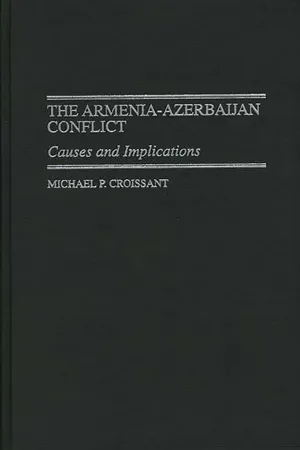
- 192 pages
- English
- PDF
- Available on iOS & Android
About this book
Of all the violent disputes that have flared across the former Soviet Union since the late 1980s, the Armenia-Azerbaijan conflict is the only one to pose a genuine threat to peace and security throughout Eurasia. By right of its strategic location and oil resources, the Transcaucasus has been and will continue to be a source of interest for external powers competing to advance their geopolitical influence in the region. Under such conditions, the possibility will remain for the Armenia-Azerbaijan conflict to reignite and expand to include other powers. The ten-year conflict between Armenia and Azerbaijan has been one of the bloodiest and most intractable disputes to emerge from the breakup of the Soviet Union. Animosity that developed between the Armenians and Azeris under czarist Russian rule was fueled by the rise of a dispute over Nagorno-Karabakh, a mountainous region for which both peoples feel an intense nationalistic affinity. The attachment of the region to Azerbaijan by Stalin in 1923 became a source of deep resentment for the Armenians, and during the rule of Gorbachev, a campaign was begun to achieve the peaceful unification of Armenia and Karabakh. Azerbaijan resisted the move as a threat to its territorial integrity, and clashes that broke out soon escalated into a full-scale war that outlived the USSR itself. Although a cease-fire has been observed since May, 1994, a peaceful settlement to the conflict has been elusive. Meanwhile, by right of both the strategic location and resources and the unique security characteristics of the Transcaucasus, major external powers—Russia, Turkey, and Iran—have sought to influence the dispute according to their geopolitical interests. With the growth of interest in the oil riches of the Caspian Sea and the increasing engagement of Western countries, including the United States, the risks and implications of renewed violence between Armenia and Azerbaijan will grow. This major study will be of interest to students, scholars, and policymakers involved with international relations, military affairs, and the Transcaucasus.
Frequently asked questions
- Essential is ideal for learners and professionals who enjoy exploring a wide range of subjects. Access the Essential Library with 800,000+ trusted titles and best-sellers across business, personal growth, and the humanities. Includes unlimited reading time and Standard Read Aloud voice.
- Complete: Perfect for advanced learners and researchers needing full, unrestricted access. Unlock 1.4M+ books across hundreds of subjects, including academic and specialized titles. The Complete Plan also includes advanced features like Premium Read Aloud and Research Assistant.
Please note we cannot support devices running on iOS 13 and Android 7 or earlier. Learn more about using the app.
Table of contents
- Contents
- Acknowledgments
- Introduction
- Abbreviations
- 1. Historical Origins of the Armenia-Azerbaijan Conflict
- 2. The Armenia-Azerbaijan Conflict, 1988–1991
- 3. Changing Regional Dynamics in the Post-Soviet Period
- 4. The Armenia-Azerbaijan Conflict, 1992–1994
- 5. The Armenia-Azerbaijan Conflict Since 1994
- 6. Future Prospects and Conclusions
- Appendixes
- Selected Bibliography
- Index